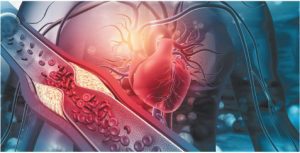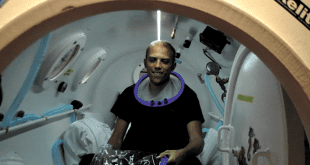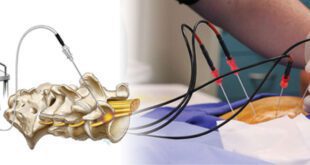By Dr. Rachit Shah
 Coronary Artery Disease (CAD) is the narrowing of the coronary arteries caused by plaque formation, which leads to the reduction in blood supply to the heart. Ischemic heart disease or coronary heart disease (CHD) are terms used interchangeably to refer to CAD. Coronary heart disease is the leading cause of death in the United States. It’s a very prevalent problem that we face. That’s why we focus on early diagnosis and management.
Coronary Artery Disease (CAD) is the narrowing of the coronary arteries caused by plaque formation, which leads to the reduction in blood supply to the heart. Ischemic heart disease or coronary heart disease (CHD) are terms used interchangeably to refer to CAD. Coronary heart disease is the leading cause of death in the United States. It’s a very prevalent problem that we face. That’s why we focus on early diagnosis and management.
Coronary arteries are the main blood supply channels to the heart. There are four main coronary arteries: the left main coronary, the left anterior descending, and the left circumflex artery, the right coronary artery.
What is CAD?
A buildup of plaque caused by atherosclerosis leads to narrowing of coronary arteries. The plaque consists of cholesterol, calcium, fatty substances, and clot-making substances (fibrin). If these plaques are minor, they do not cause any symptoms. Once these plaques become severe ie more than 70% in severity, they induce exertional symptoms at first and can gradually lead to symptoms even at rest. If these stable plaques rupture/ become unstable, they can lead to super imposed thrombus formation completely cutting of the blood supply to the part of the heart and leading to the heart attacks.
Risk Factors
Common underlying conditions can make anyone predisposed to CAD. These include:
• Hypertension
• Hyperlipidemia (High LDL and/or low HDL
cholesterol)
• Diabetes
• Family history of heart disease
• Sedentary lifestyle
• Smoking
• Age
If these risk factors are well managed, CAD issues can be mitigated or reduced. If they are left uncontrolled, the risk of developing CAD is high.
CAD Symptoms
• Chest pain (crushing or pressure type pain in
the center of chest with radiation to neck/ jaw
or left shoulder)
• Exertional shortness of breath
• Fatigue
Females may experience the following as well:
• Nausea, vomiting
• Dizziness/ lightheadedness
In some instances, we discover silent heart attacks. These are prior attacks that the patient had no idea happened. We often find these on routine testing, and they are more common in patients that have diabetes.
Diagnostics
An EKG is an initial screening test to diagnose coronary artery disease. It is often abnormal in patients having heart attacks although it can be completely normal, and patients can still have significant blockages.
Stress tests are widely used to detect significant blockages in cardiac circulation. Those can be performed using treadmill or chemically for people who can’t walk on treadmill. We can also add nuclear imaging or Echocardiography with stress test to improve accuracy of the test.
Another way to detect coronary blockages or plaque formation is imaging studies like coronary calcium score CT scan or coronary CTA. All of these tests can indicate blockages. Significant blockages are then referred for cardiac catheterization or angiography.
The gold standard for diagnosis and management of coronary blockages is coronary angiography or cardiac catheterization. These are invasive procedures performed via wrist or groin approach. These tests are performed with small tube-like devices called catheters and contrast dye. Multiple pictures of cardiac circulation or coronary arteries are taken under x ray called as coronary angiography. If any significant blockages are identified during this test, they can be fixed with balloons or stents which is called coronary angioplasty. We can now perform these procedures via the wrist, where before we usually went through the groin. It improves patient comfort as well as reduces bleeding complications.
Blocked Arteries
Significant blockages require stents implantation which is metal coil type structures coated with certain drugs. It is a safe and effective way to open the blocked arteries. Most stent deployment procedures can be done the same day in outpatient settings. If the blockages are multiple, we might recommend coronary bypass surgery. This is an open-heart procedure that utilizes bypass grafts to manage the blockages.
Risk Factor Control
I strongly believe that prevention is better than cure and that’s why I focus on life style changes with all my patients.
Lifestyle Changes
• Physical activity – I recommend 30 minutes per day of brisk cardiovascular exercise, whether biking, swimming, walking, or whatever the person can do to get moving. I suggest at least five days per week of activity.
• Stop smoking – we offer programs to help patients quit smoking, which is critical for preventing CAD.
• Healthy diet – Various studies show that a Mediterranean-style diet is effective in reducing the burden of coronary artery disease. Eating a diet rich in plants is ideal. I also recommend my patients to reduce carbohydrates such as bread, cookies, crackers, pizza, pasta, sugar, sweets, desserts etc. Only eat these types of foods in moderation once in a while. It’s also helpful to cut out processed meats and foods to reduce chemicals and toxins, which can overload the body and cause adverse health effects.
Managing your risk factors – like diabetes, blood pressure, and cholesterol makes a big impact on reducing the burden of CAD.
Medications can help reduce angina symptoms.
The most common medications are beta-blockers, nitrates, and calcium channel blockers-Some of these drugs work to reduce oxygen demand, while others dilate the heart’s arteries to improve circulation.
We have advanced knowledge, technology, and treatment options to help diagnose, monitor, mitigate or treat more CAD and heart attacks in patients than ever before.
Rach it Shah, M.D. lnterventional Cardiologist
Dr. Rachit Shah is board certified in internal medicine, cardiovascular disease, interventional cardiology, echocardiography, and nuclear cardiology. He earned his medical degree from Smt. NHL Medical Municipal College, Gujarat University in Ahmedabad, India. He then completed an internal medicine residency at Chicago Medical School/Rosalind Franklin University of Medicine and Science, in Chicago, Illinois. Dr. Shah continued his medical education by completing fellowships in general cardiology and interventional cardiology from Virginia Commonwealth University (VCU) in Richmond, Virginia. Dr. Shah has extensive expertise and special interest in coronary and peripheral interventions. He also specializes in invasive management of varicose vein disorders. He provides consultation services for diagnosis, management, and prevention of various cardiovascular disorders like coronary atherosclerosis, chest pain, congestive heart failure, cardiac arrhythmias, valvular heart disease, peripheral vascular disease, and venous insufficiency disease. He is also proficient in interpretation of various cardiac imaging studies like echocardiograms, vascular ultrasounds, carotid dopplers as well as cardiac nuclear stress tests. Dr. Shah is an accomplished author, having penned several peer-reviewed articles for a variety of prestigious medical journals. He also works as a peer reviewer for many leading publications. He has received multiple research grants from VCU medical center for research presentations. He was also nominated for and received Young Leadership Award at CRT (Cardiac Research Technologies) conference in Washington, DC. He is a fellow of the American College of Cardiology and a member of the American Medical Association. Dr. Shah is .affiliated with the Morton Plant Mease Hospitals.
BayCare Medical Group
Cardiology
6633 Forest Ave Ste 300 New Port Richey, FL 34653
(727) 724-8611
 Central Florida Health and Wellness Magazine Health and Wellness Articles of the Villages
Central Florida Health and Wellness Magazine Health and Wellness Articles of the Villages



